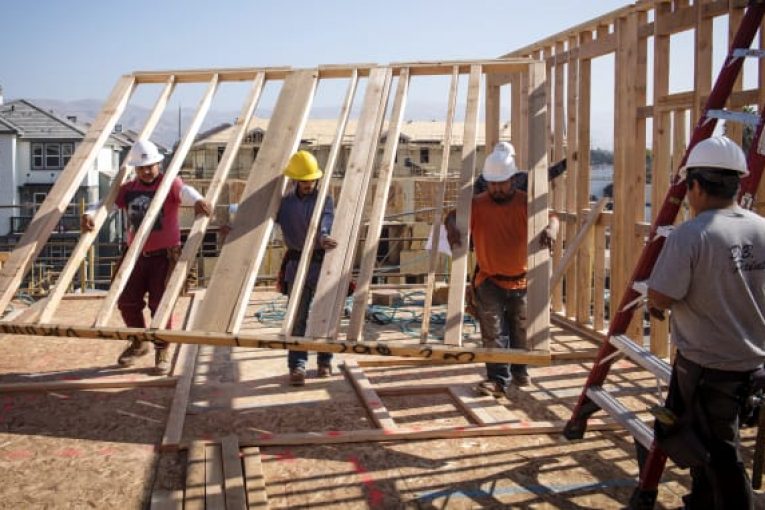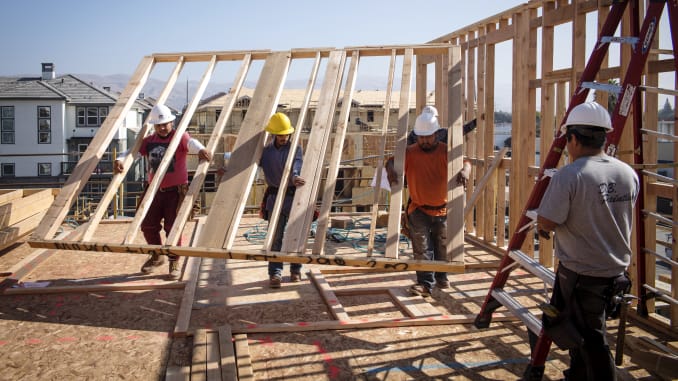

Special to the Vanguard
Sacramento, CA – After weeks of negotiations, legislative leaders announced that they have reached an agreement on a package of legislation aimed at increasing California’s housing supply.
The agreement centers around SB 6, the Middle-Class Housing Act, by Senator Anna Caballero (D-Merced) and AB 2011, the Affordable Housing and High Road Jobs Act, by Assemblymember Buffy Wicks (D-Oakland), both of which are bills that focus on streamlining housing production in commercial zones.
SB 6 would spur the creation of housing in existing commercial and retail space, and help make homeownership more attainable for working families. AB 2011 would accelerate production of millions of affordable and mixed-income housing along  transit-friendly commercial corridors.
transit-friendly commercial corridors.
“California desperately needs more housing, especially housing that is affordable for lower- and middle-income families – SB 6 and AB 2011 will help fulfill that need,” said Senator Pro Tem Toni Atkins. “This is a monumental legislative agreement, and one of the most significant efforts to streamline and amplify housing production in decades.”
By concentrating housing closer to city centers, near jobs, transit, and services, both AB 2011 and SB 6 would make a meaningful contribution to California’s efforts to fight climate change.
“The best legislative achievements—like this one—only come when you see negotiations as a non-zero-sum game. We didn’t go into this to have one side win at the expense of another. As a result, we have a housing victory that checks off a lot of the boxes—affordability, mixed-use, transit accessibility and labor security,” said Speaker Rendon.
The state will need an estimated 2.5 million new housing units over the next eight years, with more than a million units of those needing to be affordable for lower-income households, according to the California Department of Housing and Community Development’s 2022 Statewide Housing Plan.
“The bottom line is these bills are transformational for working families in California seeking housing,” said Senator Caballero, Chair of Senate Governance and Finance. “It’s been a pleasure to work alongside Assemblywoman Wicks, a tireless advocate for housing in California. Coupled with historic state investments, including $500 million to help working families achieve the California Dream of homeownership, I believe both of these bills will make tremendous progress to help families in California have a place to call home.”
Working in tandem, the bills are anticipated to increase housing production efficiencies across California, while strengthening labor standards and growing the workforce that will build that housing for years to come.
“These bills will change the trajectory of California’s housing crisis,” said Assemblymember Wicks, Chair of the Assembly Committee on Housing and Community Development. “The impact will be historic—no longer will lack of land be an issue for housing production. No longer will there be a lack of incentive for workers to join the construction workforce. And, no longer will red tape and bureaucracy prohibit us from building housing in the right locations to address our climate crisis.”
Negotiations were led by Senate Majority Leader Mike McGuire (D-Healdsburg), who was instrumental in efforts to arrive at a compromise that will ultimately open the door to more housing in California.
“The housing crisis is one of the greatest in our state’s history. SB 6 and AB 2011 represent the bold and decisive action this state and our communities need,” McGuire said. “This historic agreement represents a one-two punch that will expedite the buildout of thousands of homes in all corners of the Golden State in the years to come. We are all grateful for the tenacious work of Pro Tem Atkins and Speaker Rendon on this critical issue—we wouldn’t be here without their leadership.”
The agreement also is supported by the NorCal Carpenters Union, Southwest Regional Council of Carpenters, and the State Building and Construction Trades Council of California, which represent hundreds of thousands of workers.
“AB 2011 will raise the wages and improve the working conditions for tens of thousands of low-wage construction workers, level the competitive playing field for all law-abiding contractors, union and non-union, and break the housing construction log-jam,” said Jay Bradshaw, Executive Officer, NorCal Carpenters Union. “It’s time to get to work building the millions of new homes California needs, particularly affordable workforce housing.”
“Standing strong for working families is our top priority and we can’t do that without building housing for the middle class,” said Andrew Meredith, President, State Building and Construction Trades Council of California. “SB 6 is the culmination of years of work, and is a game changer for working families to achieve the American Dream and it will protect workers from exploitation. As we’ve said all along, our members and apprentices are ready and prepared to build us out of the housing crisis. Let’s get SB 6 done and finally start building.”
“This housing package will rebuild our communities with affordable housing and guarantee decent wages and middle-class careers for the young local workers that will be put to work,” said Pete Rodriguez, Executive Officer, Southwest Regional Council of Carpenters.






Well that immediately sounds the alarm…
How much more expensive will this make the price of these supposedly “affordable” homes?
Perfect – force cities to eliminate their commercial space (and their tax base) entirely.
What could go wrong with that?
Cities will consist of nutin’ but housing.
Then again, if folks are working from home – their homes become their places of employment.
In any case, it would be interesting to know the tax implications for government, as a result of this.
There is no housing shortage. This is the very definition of “fake news”. There are challenges regarding affordability, but only for some.
The population has been dropping, not growing.
What we’re seeing here is a result of combined special interests (labor/construction, schools, technology, real estate interests, etc.). The usual bunch, who aren’t happy when a population levels-off or declines. And they’re essentially running state government.
They don’t care about their own cities. The only way that cities can fight back is if they band together.
Actually, I’d like to clarify this.
The challenges regarding affordability that some have been experiencing are a direct result of some of the same interests which are now claiming a “housing shortage”. The technology industry (in Silicon Valley) is a perfect example of that.
But again, where is the analysis regarding a “housing shortage” in regard to a state that has been experiencing a declining population? Wouldn’t it be more accurate to describe the ever-changing numbers as more of a growth “goal” coming from those same interests – which “aren’t happy” when a state stops growing? The same interests which helped put these state politicians in office in the first place?
Folks, state government does not work for “you”, unless you’re one of these interests. They’ve essentially declared war on existing cities and their residents. They are not your friend. (There’s other examples of this, as well.)
Unfortunately, both of the major parties kowtow to these interests. Voters don’t really have a choice, due to the barriers built into the political system itself.
In any case, if you’re going to enact a bill removing a city’s authority to maintain its commercial base, shouldn’t the bill (at least) require some Affordable housing? (One of the bills does not, though it appears that cities may still have some input regarding that.)
Here’s some more information, for those actually interested in at least some analysis:
For example:
https://calmatters.org/housing/2022/08/california-housing-crisis-labor-deal/
Note how this is being framed as a “labor deal“, with no analysis regarding the claimed “housing shortage”.
And one of the bills doesn’t require any Affordable housing whatsoever, while simultaneously forcing local governments to rezone commercial sites for housing.
Come to think of it, what would prevent a peripheral “innovation center” to be subsequently rezoned for housing?
https://calmatters.org/housing/2022/08/california-housing-crisis-labor-deal/
AB 2011 could be the worst bill of 2022 for taking away local control!
AB 2011 was a gut and amend that created a massive new bill on April 18th
It requires ministerial approval of construction across a broad category of zones – including office, retail, and parking.
AB 2011 is a massive state taking of flexibility needed by local jurisdictions to place housing where it best meets the needs of the community.
CEQA is circumvented on these projects. CEQA is an important source of information to the community and developers and helps protect the environment.
Cities are not allowed to require parking for these projects. Parking is a necessary feature for many developments. Any developments containing commercial space are particularly sensitive to parking needs.
The bill’s labor requirements make the cost of housing higher than necessary when what we need is more affordability.
The bill’s contains monthly labor reporting requirements that are a burden on both construction contractors and the local governments expected to enforce the bill’s labor requirements.
The department is allowed to adopt guidelines or terms that are not subject to the Administrative Procedures Act Government, taking away an important review process.
AB 2011 details pages of standards imposed by the state that are best left to local communities.
https://www.livablecalifornia.org/ab-2011-could-be-the-worst-bill-of-2022-for-taking-away-local-control/
You seem to have omitted the MOST important point: “100% of the units are affordable to lower income households.”
Excellent. I hope Yolo County builds its share on county land adjacent to the cities where access to transit will have the lowest carbon footprint.